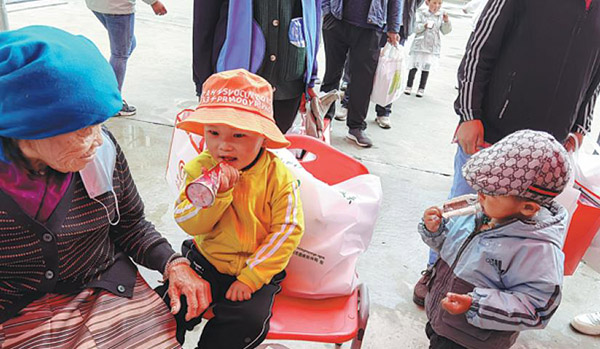Wall's offers Lhasa helping hand
Updated: 2021-08-06 By LIU YUKUN (China Daily)  Print
Print 



Children enjoy ice creams donated by Wall's in Lhasa, the Tibet autonomous region. [Photo/China Daily]
Unilever unit joins in rural revitalization with efforts in Tibet autonomous region
The global ice cream brand Wall's is working with the China Environmental Protection Foundation to run a cultural and recreational program in communities in Doilungdeqen district of Lhasa, the Tibet autonomous region, to help contribute to the nation's rural revitalization drive.
Two cultural and recreational centers have been built in villages in Doilungdeqen this year. The centers will offer leisure activities to more than 2,000 local residents.
The two centers will use professional visual and acoustic equipment for Tibetan musical and dance routines to promote Tibetan culture. The venues are also equipped with computers, artificial intelligence learning machines and many other facilities to educate students.
For children, the two centers have legos, magnetic sticks, drawing books and other materials for learning purposes alongside slides, scooters and other sporting goods for physical education.
Through the program, Wall's hopes to provide not only material resources, but also spiritual joy to local communities, bring residents better cultural and recreational facilities and also increase the utilization rate of entertainment facilities in rural areas. The company's eventual goal is to empower local residents and help with the country's overall rural revitalization drive, said Xu Yucong, vice-president of foods and refreshment North Asia of Unilever, a global food and personal care conglomerate that owns Wall's. Local rural residents also received 10,000 ice creams for free from the company through the program.
Going forward, the program will encourage parents to engage in more activities with their children, such as handicrafts, painting, acting and gaming, all in an effort to offer various sources of early education to children in rural areas. The program will also support communities to carry out cultural and entertainment activities related to traditional Tibetan festivals.
Wall's is among many domestic and overseas companies that have actively participated in China's rural revitalization campaign. Rural revitalization is a follow-up goal to an eight-year campaign that ended absolute poverty in 2020. The rural revitalization strategy was announced by China's leadership in 2017.
The country vowed to promote comprehensive revitalization and development of rural areas through developing new industries, new business forms and new models to boost economic development and improve quality of life for those in underdeveloped areas during the 14th Five-Year Plan period (2021-25).
"Rural revitalization is a long-term systematic campaign. The goal is to achieve comprehensive revitalization in the fields of industry, talent, culture, ecology and organization. Among them, cultural revitalization in rural areas is an important part," said Fang Zhi, deputy secretary-general of the China Environmental Protection Foundation.
Zhou Minliang, a senior researcher at the Institute of Industrial Economics of the Chinese Academy of Social Sciences, said rural revitalization plays an essential role in improving residents' economic status and quality of life through concerted efforts from local governments to develop industries and boost regional economy.
"Currently, many villages are stepping up efforts to develop agricultural products with regional characteristics, 'agritainment'-farm-related tourism or entertainment activities-and folklore or cultural related industries, under the framework of the rural revitalization strategy," Zhou said.
"Such agricultural or agritainment programs in villages, especially those with scenic views and unique folklore, are attracting an increasing number of tourists who seek to catch a break from busy urban lives, and are very helpful to increase incomes and improve the quality of life for locals. In recent years such programs have also drawn increasing interest among investors," Zhou said, adding that the rural revitalization strategy is also an important helper for the new dual-circulation development pattern, which takes the domestic market as the mainstay while letting foreign and domestic markets reinforce each other, through boosting consumption and developing tourism.
Zhou also noted that there are also challenges to running businesses and forming industries in villages. "Take the agricultural or agritainment programs as an example. There is a need to set up regulations regarding safety and hygiene of agricultural products, especially for those sold from family-run or smaller stores. There is also a need for regulations on charging and services for homestays, tourism and other agritainment programs."
Zhou added: "Many businesses in rural areas are in need of professional managers. However, currently some operators lack related knowledge or experience, and many businesses find it hard to hire people as young villagers tend to go out and find jobs with higher pay in big cities."








